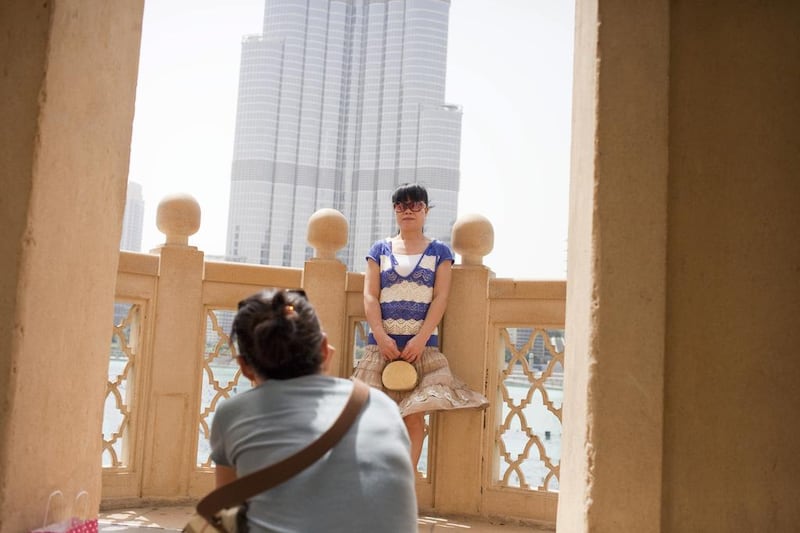Wealthy Chinese visitors have nominated Dubai as their third most preferred luxury travel destination in the world.
Only Australia and France rank higher. Dubai rose in popularity among high net worth Chinese travellers from eighth spot last year, according to a Chinese Luxury Traveller report released this month by the Shanghai-based research group Hurun Report and International Luxury Travel Market Asia.
The Hurun Report and the Chinese outbound luxury travel agency Diadema surveyed 203 travellers who spent at least US$25,000 per trip in the past three years, and visited an average of 40 countries.
Last year, 98 million Chinese travelled abroad, a 17.8 per cent rise on 2012, according to the National Tourism Administration. Despite a slowing economy, the number of millionaires in the country has risen. China had 2.9 million dollar millionaires in 2013, a year-on-year increase of 3.6 per cent on 2012, the group’s report said.
At least 10 per cent of those surveyed said Dubai was the top destination for shopping and a similar number said Dubai is a “must- visit destination in the next three years”.
When on holiday, they enjoyed shopping for watches, jewellery, consumer electronics and clothing from high-end fashion houses such as Louis Vuitton and Chanel among the preferred brands.
“The findings are not a surprise,” said Mac McClelland, the president and chief executive of The Luxury Marketing Council (Middle East) in Dubai. “The numbers have been rising after the Chinese government designated the UAE as an approved travel destination.” That approval came in 2009.
The number of Chinese tourists, although smaller than Saudi, Indian and British travellers, has been rising fast. Last year, Dubai’s hotels checked in 275,675 visitors from China, an increase of 11 per cent compared with 2012.
For the past few years, retailers, tour operators and hoteliers in the UAE have been wooing Chinese travellers, who now make China the largest outbound travel market in the world.
The UAE’s tourism agencies and hotel operators have been promoting experience-based travel to Chinese travellers, such as desert getaways.
“Experiential travel rather than just shopping tours are becoming more popular now that the Chinese luxury consumer has travelled more widely,” said Rupert Hoogewerf, the chairman of Hurun Report and its chief researcher, in a note.
Mr McClelland agreed.
“Chinese travellers tend to change hotels every day so that they get to stay in different hotels [especially within the luxury segment]. They love going on desert drives and barbecues, buy Islamic art, and shopping,” he said.
The popular travel period was around the Chinese New Year for 54 per cent of those surveyed, a 7 per cent increase over last year.
This year, Dubai hotels such as Shangri-La, Dusit Thani and Atlantis featured Chinese buffets, lion dances and even handed out red envelopes with prizes, while Mall of the Emirates organised traditional Chinese performances and Souk Madinat Jumeirah hosted a Chinese circus around the Chinese New Year.
As China’s rich travelled more on business, the sector is no doubt more lucrative. Its high net worth individuals were on the road for 7.5 days a month and the the top 10 per cent of the richest travelled for 12 days a month.
“For business travellers, the emirate provides access to the wider [Middle East, North Africa, South Asia] region and also to the markets of Africa and South America,” said Issam Kazim, the chief executive of the Dubai Corporation for Tourism and Commerce Marketing.
In April, 14,500 sales agents and employees of the Chinese company Nu Skin visited Dubai and Abu Dhabi as part of the company’s incentive travel.
The uplift provided by Emirates Airline has also helped. Its 35 flights a week to Beijing, Shanghai and Guangzhou are operating at maximum capacity, according to Barry Brown, a senior vice president at Emirates.
China was Dubai’s top trading partner in the first quarter of this year, with trade growing 27 per cent year-on-year to Dh38.5 billion, Dubai Customs data showed. China accounts for 12 per cent of the emirate’s overall foreign trade.
ssahoo@thenational.ae
Follow us on Twitter @Ind_Insights





